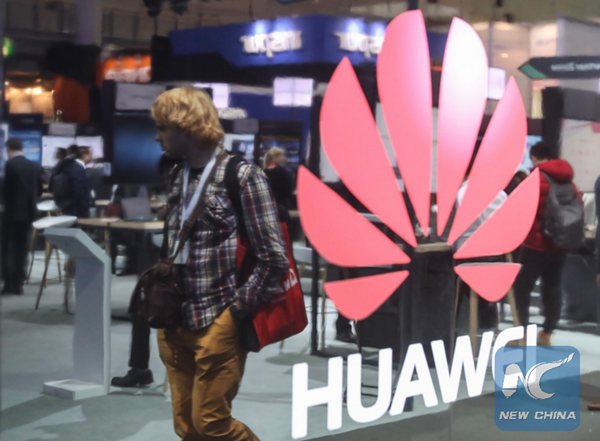

Chinese telecom giant Huawei on Sunday responded to rumors of its withdrawal from the U.S. market after it was accused by U.S. authorities of conducting “corporate espionage”.

Following Trump administration’s ratcheting up efforts to hinder Chinese high-tech companies’ access to the U.S. market, Huawei, the world’s largest telecom equipment supplier, has bogged down in constant Sino-US finger pointing and has been reportedly planning to exclude U.S. market from its grand global development strategy.
According to an analysis released by Forbes in April, Huawei is believed to permanently shut down its U.S. operations selling telecommunication equipment, despite the fact that it still has plans to launch its latest MediaPad Android tablet and Matebook X Pro Windows laptop in the U.S.
Such opinion is also shared by The New York Times, which in its April commentary projected Huawei’s possible retreat from the U.S. market, as the former’s unremitting attempts to thwart U.S. roadblocks turned out to be fruitless.
In response to the speculations, Huawei told Jiemian.com on Sunday that “Huawei’s U.S. market developing strategy should only be subject to the company’s official release and final confirmation.”
Though the company has yet confirmed to withdraw from U.S. market, its annual fiscal report somehow revealed the company’s gloomy and arduous development in U.S. Though Huawei’s net profit in 2017 grew by 28 percent to $7.55 billion, the growth was mainly driven by its Chinese market, as well as markets in Asia-Pacific, the Middle East and Europe. The report also emphasized that the obstacles Huawei faces in U.S. market has prompted the company to “work harder in other markets.”
Meanwhile, Trump Administration’s espionage accusation has also added insult to Huawei’s injury. According to the United States-China Economic and Security Review Commission in April, Huawei, along with its competitor ZTE Corp, were labeled as possible actors conducting corporate espionage in U.S.
“The US' cracking down on China's scientific and technological development and progress under the pretext of national security actually constitutes an unreasonable act of economic and technological hegemony,” said Hua Chunying, spokesperson of China’s Ministry of Foreign Affairs on April 20.
“The US restrictions on the China-US high-tech trade and investment activities on the ground of national security from time to time is apparently an act of protectionism under the disguise of national security," Hua added.
 Fire brigade in Shanghai holds group wedding
Fire brigade in Shanghai holds group wedding Tourists enjoy ice sculptures in Datan Town, north China
Tourists enjoy ice sculptures in Datan Town, north China Sunset scenery of Dayan Pagoda in Xi'an
Sunset scenery of Dayan Pagoda in Xi'an Tourists have fun at scenic spot in Nanlong Town, NW China
Tourists have fun at scenic spot in Nanlong Town, NW China Harbin attracts tourists by making best use of ice in winter
Harbin attracts tourists by making best use of ice in winter In pics: FIS Alpine Ski Women's World Cup Slalom
In pics: FIS Alpine Ski Women's World Cup Slalom Black-necked cranes rest at reservoir in Lhunzhub County, Lhasa
Black-necked cranes rest at reservoir in Lhunzhub County, Lhasa China's FAST telescope will be available to foreign scientists in April
China's FAST telescope will be available to foreign scientists in April "She power" plays indispensable role in poverty alleviation
"She power" plays indispensable role in poverty alleviation Top 10 world news events of People's Daily in 2020
Top 10 world news events of People's Daily in 2020 Top 10 China news events of People's Daily in 2020
Top 10 China news events of People's Daily in 2020 Top 10 media buzzwords of 2020
Top 10 media buzzwords of 2020 Year-ender:10 major tourism stories of 2020
Year-ender:10 major tourism stories of 2020 No interference in Venezuelan issues
No interference in Venezuelan issues
 Biz prepares for trade spat
Biz prepares for trade spat
 Broadcasting Continent
Broadcasting Continent Australia wins Chinese CEOs as US loses
Australia wins Chinese CEOs as US loses